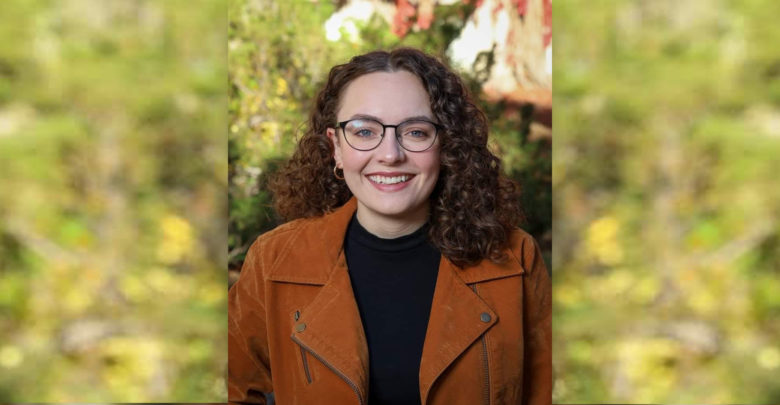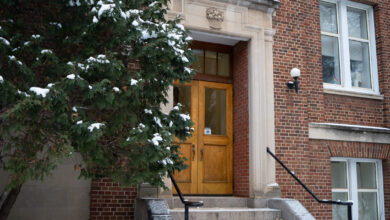 Supplied
SuppliedEach year, The Gateway publishes an evaluation of the Students’ Union Executive and the Board of Governors representative. It’s impossible to discuss every aspect of their tenures, so these reports are largely based on the major components of the platform each executive campaigned on, and the most significant responsibilities of their respective positions.
And if you’re short for time, check out our TLDR for a bite-sized breakdown.
Talia Dixon: A-
The vice-president (student life) is responsible for advocacy in all things non-academic to help improve the student experience. This includes mental health supports, residences, student services, and planning events.
Talia Dixon ran on making campus a more inclusive space where no one gets left behind; she made great strides towards achieving that goal.
Working towards inclusivity was really Dixon’s area of strength this year. One of her platform points was to conduct a pronoun campaign to provide resources to students and professors about gender and diversity. Building off the work of The Landing, Dixon got hundreds of professors to sign-up to take part. While sharing resources isn’t anything groundbreaking, Dixon delivered on her promise here and this was definitely a win for inclusivity.
The period equity project led this year by Dixon and Emily Kimani, vice-president (operations and finance), saw new menstrual product dispensers installed in the Students’ Union Building (SUB). While this project has been ongoing for many years, the new dispensers this year were a huge improvement to accessibility as grabbing products used to be less private, in baskets at InfoLink desks. These will also be piloting more sustainable products from August and a new dispenser will be going up in Campus Saint-Jean (CSJ).
The family lounge was another ambitious goal on Dixon’s platform that looks like it will be accomplished. The idea behind the family lounge is that there are not enough child-friendly spaces on campus for students with dependents.
Not only has a space been secured for the family lounge, but according to Dixon, funding has also been secured and the lounge should be opening by Fall semester at the latest — a huge win for students who parent on campus. The lounge will be located in Rutherford Library and features a kitchen and “lots of really nice natural light.” Dixon described the progress on the family lounge as “really exciting.”
“The first time I ran this was [as] one of my main goals, and I didn’t think that it was going to happen for a long time; but finally, there’s been kind of a breakthrough in space identification and funding,” she said.
While some ideas fell flat, big steps were taken for sexual violence on campus
Sexual assault was a major focus for all of the execs this year. Dixon did a lot of the outward-facing work, creating an Instagram account @ibelieveyou_uofa to share resources with survivors. While I think there is a danger for social media activism to be performative, Dixon argued that it is fact the opposite, and she sees it as something that allows the Students’ Union to get more involved.
“I think the SU for many years, we’ve done a lot of advocacy and that’s really great. But we need to be doing more to actually support survivors ourselves and to educate our community because we should have the capacity to do that,” she said.
While this idea has merit, I’m unsure this Instagram account will be a major resource students use in future years. The account does not currently have a large following, it does not consistently post, and when it does, it is not much more than phone numbers, websites, and the SU’s own advocacy work. While sharing resources is certainly important, I would’ve liked to see more from this account — like sharing events and workshops that are being offered on sexual assault on campus. For example, the Sexual Assault Centre is held a biannual Sexual Assault Awareness Week, with plenty of great events, and @ibelieveyou_uofa made no mention of it besides a story post on the second last day.
This year Dixon has also been doing external advocacy for the joint letter on sexual violence created by student representatives, which listed 10 demands for the University of Alberta to take. In addition to The Gateway, Dixon spoke to CBC News and Global News about the letter. Of the 10 demands, Dixon said the university has “committed loosely, to doing every demand basically.”
While the university may have verbally committed to these 10 demands with Dixon, nothing in writing from the university seems to prove this. The Gateway reached out to the university for comment, and were referred to a statement from Steven Dew, provost and vice-president (academic) of the university, which commits to a few of them, but not all of them explicitly.
That being said, some of the demands are more likely to come to fruition in the near future than others, the major one being the hiring of the long-awaited sexual violence prevention and response coordinator. The Students’ Union has been trying to get the university to follow through on creating this role and hiring someone since 2016; finally getting someone in this role after five years of waiting is a huge victory and probably Dixon’s biggest lasting impact for students. That being said, the victory is the result of many people’s work. The previous VPSL Katie Kidd was the one who got the university to commit to the hiring while Dixon oversaw this process and ensured the university followed through.
Another demand from the petition was providing better training for residence assistants (RAs) and giving training on consent and awareness to students living in residence. Dixon told me the university has now committed to this by Fall 2022 and development for that training is already in the works. The rest of her term will be focused on holding the university to their commitment to these demands and preparing the next vice-president (student life) to continue this work.
One area where Dixon did not achieve her platform goals was mental health and events. Funding issues and the grant negotiation process prevented Dixon from achieving same-day appointments for counselling and clinical services, so Dixon has instead focused on spreading awareness of same-day appointments available through Empower Me. While Empower Me is a great service on our campus, it is not an adequate replacement for counselling and clinical services; you need to be in the healthcare plan to access it, and you may not get the exact service you’re looking for.
Logistical problems due to pandemic disruptions prevented RezFest from happening this year. While Indigenous Celebration Week did get postponed, the event should be happening in March for the first time on campus. COVID-19 certainly through a wrench in the ability to plan events but Dixon probably could have done more. I wonder for example, if RezFest could have been rescheduled or held online instead of just cancelled entirely.
TLDR: Dixon achieved saw the fruition of many multi-year projects like menstrual product dispensers and the hiring of the long-awaited sexual violence response and prevention coordinator. In a year that saw sexual violence on campus as a major issue, she made major strides and stood up to the university administration. While she didn’t achieve everything in her platform, her successes will leave big expectations and shoes to fill for the role.
A-range: This person has fulfilled the promises they campaigned on and more, has created tangible change during their tenure, and has shown a commitment to improving the lives of students. Their GPA is top tier.
B-range: This person has done their job consistently well, but has not made any remarkable changes, or has fallen short on important goals they set out in their platforms. They’re doing fine, but it’s nothing to phone home about.
C-range: This person has done their job sufficiently, but has failed to make significant progress in the areas most relevant to their portfolio, or has essentially abandoned a major part of their platform. They’re still passing with a safe buffer though, and Cs get degrees!
D-range: This person has done a very lacklustre job, and has not sufficiently fulfilled their campaign promises or the responsibilities of their position.
F-range: This person has not done their job, has not represented students, and has not fulfilled their campaign promises whatsoever.




